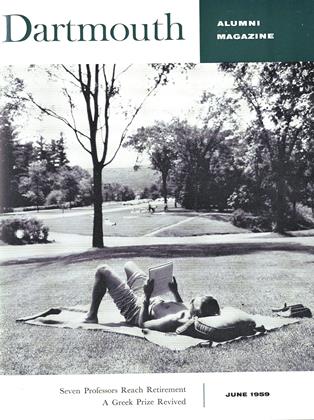BY the time this issue is in alumni hands, Dartmouth's first academic year under the three-term, three-course program will have ended. It is with a sigh of relief, no doubt, that the faculty reaches the summer breathing spell. Opinions vary about this initial "three-three" year, but the one point on which there seems to be no argument is that everybody, and especially the faculty, has had to work harder.
This month's Undergraduate Chair discusses the past year from the student's point of view. How things have been going in the eyes of the faculty was briefly reported to the Dartmouth class officers early last month when they gathered in Hanover for their annual meetings and heard a report from Prof. Arthur E. Jensen, Dean of the Faculty.
The consensus about the new educational program .is generally favorable, Dean Jensen said. While admitting that all is not rosy and that problems have arisen, such as the brief examination periods and the academic disadvantage to athletes who have to be absent on extended trips, he reported that nothing has developed to spoil confidence in the program. The general aim, he said, is to close the gap between the potential and the achievement of the Dartmouth undergraduate, and by means of a changed emphasis to put the burden for learning where it belongs, on the student.
That the students are working a lot harder there can be no doubt, Dean Jensen said. As tangible signs of more independence in learning he cited an increase of 32% (up to April 1) over last year in the circulation of general books at Baker Library, and the sale by the Dartmouth Bookstore of two and a half times as many paperback copies of general titles. He also cited the case of French 2, which gives its students the CEB tests at the end of the course. In the past, 12 to 15% of the men have scored 600 or better; this year 46% did that well. Finally, Dean Jensen reported that a growing number of inquiries about Dartmouth's three-three plan are being received from other colleges, indicating the influence that the program is having beyond Hanover.
Dean Jensen addressed the class officers only briefly, and a longer talk would undoubtedly have brought out more qualifications and more discussi of "bugs" in the new curriculum. Faculty members, queried here and there, are all agreed that one year ,is a wholly inadequate period for forming any opinion about the program. Getting the plan under way has involved difficulties that are not likely to be encountered in another year, they hope. The independent reading program "is not right yet," several professors state. And one social scientist says, "The intensity and depth of student work has been increased, yes; but the present concentrated approach has lost us some of the old values of maturation and has made it impossible, for example, to carry out study projects that were done before with more time and the use of the vacation periods."
But every faculty member approached agreed that it could be fairly stated that under the three-three plan the Dartmouth undergraduate is working harder in his studies and is working more on his own. To which was invariably added: "The new curriculum makes much greater demands on the teacher, and I'm working harder too!"
 View Full Issue
View Full Issue
More From This Issue
-
 Feature
FeatureMy 65 Years as a Class Secretary
June 1959 By CHARLES C. MERRILL '94 -
 Feature
FeatureA Panathenaic Prize Amphora
June 1959 By DIETRICH VON BOTHMER -
 Feature
FeatureLOG DRIVE
June 1959 By DOUGLAS M. PEASE JR. '58 -
 Feature
FeatureRetirement Nears for Seven Dartmouth Professors
June 1959 -
 Article
ArticleThe Fraternity Discrimination Issue
June 1959 -
 Article
ArticleTHE UNDERGRADUATE CHAIR
June 1959 By RONALD F. KEHOE '59
Article
-
 Article
ArticleCOLLEGE ACQUIRES GOLF LINKS
June, 1914 -
 Article
ArticleThayer and Tuck Schools Award Degrees to 87 Men
July 1956 -
 Article
ArticleFootball
December 1955 By CLIFF JORDAN '45 -
 Article
ArticleTrack
May 1958 By CLIFF JORDAN '45 -
 Article
ArticleIrresistible Art
NOVEMBER • 1987 By Teri Albright -
 Article
ArticleELECTIONS
OCTOBER 1931 By W. H. Ferry '32

